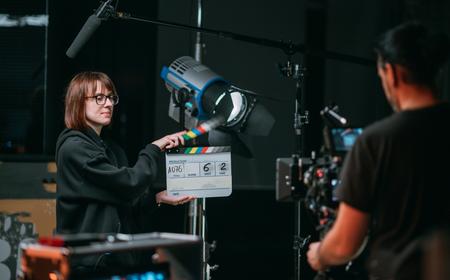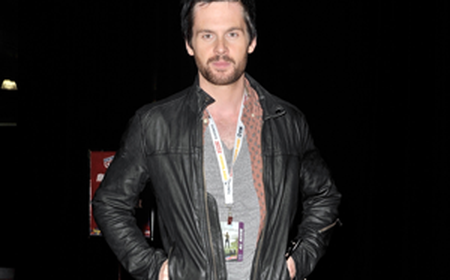
"I think in 2009 we need to have much more energy to hold an audience's attention," offers Robert Currier, artistic director of Marin Shakespeare Company, an outdoor summer theater in the San Francisco Bay Area. In his recent production of Oscar Wilde's "The Importance of Being Earnest" (which he calls a "verbal farce") was a Miss Prism so exceedingly fluttery that it seemed natural for her to engage in a variety of physical antics and pratfalls, and an Algernon who wandered cheerfully into the audience, grabbing sandwiches from people's picnic baskets and munching them (entirely justified by the fact that Wilde's Algie is a bit of a compulsive eater). Purists might say, "Aren't Wilde's witticisms enough?" But the audience, including me, loved seeing the comedy's farcical opportunities.
"In reality TV, you see people doing these ridiculous things—they'll do anything to become stars," says freelance director Mark Rucker. "Reality TV changes the way we see entertainment," raising the bar on what farcical behavior is.
But whether farce needs to be bigger than ever these days is for directors to decide. What actors need to know is that it does indeed need to be big and bold, as long as it's truthful within the context of the play's world. Actors also need to know what directors look for when casting a farce, what performers should bring to rehearsals, how much is too much, and how much is too little.
I recently saw a farce in which the central character, played by a reliably fine actor, remained an island of serenity amidst escalating chaos. A good choice in another context, perhaps—but not in farce. If all the characters don't get caught up in the spiraling action, the humor falls flat.
How do actors justify that kind of frazzled, exaggerated behavior (because justify it you must)? "You can always find a reason for somebody to do something," says Currier, "whether they're angry or frustrated or releasing long-held, pent-up emotion." Go see a Marx Brothers movie to see how it's done, he suggests.
Karl Kippola, a professor at American University in Washington, D.C., teaches his students how to justify "the magnitude of choices" required to play farce by pointing out moments in our everyday lives when our responses or actions seem out of proportion: "If the fast-food place gets our order wrong, if someone cuts us off in traffic, if we miss the bus, ordinarily normal people will freak out. If we can act in a larger-than-life manner about unimportant things, imagine what happens when the stakes truly are life and death."
The fact is, almost nothing is too much in farce, if it's justified and played truthfully. But that's a big if.
Raising the (Mis)Stakes
Don't start out trying to be funny, warn some of the directors I talked to. What you should bring to early rehearsals is what you'd bring to any rehearsal: a willingness to examine the given circumstances and look for your character's actions and objectives. As Kippola points out, it doesn't necessarily help actors to know they're in a comedy. Rarely is comedy per se taught; rather, actors are taught an acting technique that ought to serve them for any project.
"The key is never losing hold of the reality of the situation," Kippola says. "What the audience is going to find funny is when things spiral further and further out of control as these recognizable human beings' comfort zones keep shifting, moment to moment." The challenge is to be human while being big and broad. "Some actors have an instinctive feel for that," he says. "For others, their desire to embrace realism and honesty makes it feel false to them. The challenge in working with these actors is getting them to see they can make big choices while staying honest."
He adds, "I'm not interested in farces I can't relate to on a human level." Kippola concedes that audiences may well laugh at big, zany, unsubstantiated choices—but for the wrong reasons. Indeed, I've seen audiences guffaw when actors (and directors) pander to them, evoking cheap laughs. But that's not what you really want to do, right?
Kippola recently directed back-to-back productions of "Tartuffe," one with students and one with professionals, and found that the students were more willing to do whatever he suggested, to dive in with big, strong choices, while the older, more-seasoned actors needed encouragement. In rehearsal, the professionals "brought their own interpretations," he says, "and making all those styles mesh was one of my biggest challenges, especially if one person is making big, bold choices and another less so. If everyone's not on the same page, you'll have an uneven production. Sometimes you have to pull back the more brilliant, interesting choices" for the sake of consistency.
"The hard thing about any comedy, but especially farce, is it has to be played truthfully," concurs Art Manke, who recently directed Michael Frayn's "Noises Off" at South Coast Rep in Costa Mesa, Calif. In farce, "a lot of people come to the material thinking, 'I have to do funny business, be broad.' The thing I discovered is that the obstacles are multiplied tenfold. They grow over the course of the play, forcing the actions and objectives to be stronger. That's what leads to the frenetic pace and heightened state.
"It's got to be played truthfully," he continues, "and I don't believe truth has a size. It can be the scale you play the Hollywood Bowl or the scale you play a film—you have to suit the scale to the venue."
Rucker agrees: "You keep raising the stakes in farce so an actor discovers what his character's trying to do—then you make them do it 10 times more than in real life. That's, hopefully, hilarious and kind of moving because it's so human."
It's tempting for actors to go straight for the humor, Kippola says, but he didn't touch that until a week or two into rehearsals for "Tartuffe": "If you try to make it funny first, it's difficult to make it rooted and honest." His early rehearsals were all about: Who are these characters? What are their relationships? What do you want? How are you going to get it? That's the time to establish the parameters of behavior in the world that's being created, he says, so actors can use them as guides in focusing their choices.
An instinct for comic timing, stamina for the demanding physical elements, a willingness to make—and the ability to justify—big choices, an understanding of how to raise the stakes for your character, emotional honesty, a spirit of cooperation (farce requires detailed ensemble work): All these are skills needed for farce. How does a director spot these qualities when casting? Rucker says he looks for a certain kind of fearlessness. But all things being equal, he adds, he'll choose the actor with the best access to truth over the one who makes superficial comic choices, because the truthful actor "I'd assume I could bring to bolder places."
On the other hand, Kippola says, "You have to show you're willing to dive in and commit. If I have an actor that can do that, then I can make sure their choices are rooted and honest." Two different directors, two different preferences.
"Audiences will laugh at something funny," says Rucker, "but laugh and be moved at something truthful." And as Kippola remarks, "The secret to success in farce is raising the stakes to a ridiculous level. Emotional investment will solve many acting problems."















